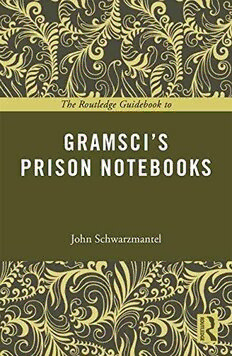
The Routledge Guidebook to Gramsci's Prison Notebooks PDF
Preview The Routledge Guidebook to Gramsci's Prison Notebooks
Template:NewCriticalIdiom,Font:GaramondandScalaSans,3B2version: 10.0.1465/W Unicode(Dec222011)(APS_OT) Date:02/12/2014; Dir: //integrafs1/KCG/2-Pagination/TandF/GRAM_COR/ApplicationFiles/ 9780415714167_text.3d Routledge Guides to the Great Books The Routledge Guidebook to ’ Gramsci s Prison Notebooks Gramsci’sPrisonNotebooksareoneofthemostimportantandoriginalsourcesof modern political philosophy, but they present great difficulties to the reader. Not originallyintendedforpublication,theirfragmentarycharacterandtheiroftencryptic languagecanmystifyreaders,leadingtomisinterpretationofthetext.TheRoutledge Guidebook to Gramsci’s Prison Notebooks provides readers with the historical background, textual analysis and other relevant information needed for a greater understandingandappreciationofthisclassictext.Thisguidebook: (cid:1) ExplainstheargumentspresentedbyGramsciinaclearandstraightforwardway, analysingthekeyconceptsofthenotebooks (cid:1) Situates Gramsci’s ideas in the context of his own time, and in the history of political thought, demonstrating the innovation and originality of the Prison Notebooks (cid:1) Provides critique and analysis of Gramsci’s conceptualization of politics and history(andcultureingeneral),withreferencetocontemporary(i.e.present-day) exampleswhererelevant (cid:1) ExaminestherelevanceofGramsciinthe modernworldanddiscusseswhyhis ideashavesuchresonanceinacademicdiscourse. FeaturinghistoricalandpoliticalexamplestoillustrateGramsci’sarguments,along with suggestions for further reading, this is an invaluable guide for anyone who wantstoengagemorefullywiththePrisonNotebooks. John Schwarzmantel is Visiting Research Fellow in the School of Politics and InternationalStudies,UniversityofLeeds. Template:NewCriticalIdiom,Font:GaramondandScalaSans,3B2version: 10.0.1465/W Unicode(Dec222011)(APS_OT) Date:02/12/2014; Dir: //integrafs1/KCG/2-Pagination/TandF/GRAM_COR/ApplicationFiles/ 9780415714167_text.3d THE ROUTLEDGE GUIDES TO THE GREAT BOOKS Series Editor: Anthony Gottlieb The Routledge Guides to the Great Books provide ideal introductions to the work of the most brilliant thinkers of all time, from Aristotle to Marx and Newton to Wollstonecraft. At the core of each Guidebook is a detailed examination of the centralideasandargumentsexpoundedinthegreatbook.Thisisbookendedbyan openingdiscussionofthecontextwithinwhichtheworkwaswrittenandaclosing lookatthelastingsignificanceofthetext.TheRoutledgeGuidestotheGreatBooks therefore provide students everywhere with complete introductions to the most important,influentialandinnovativebooksofalltime. Available: Hobbes’LeviathanGlenNewey Galileo’sDialogueMauriceA.Finocchiaro Aristotle’sNicomacheanEthicsGerardJ.Hughes Hegel’sPhenomenologyofSpiritRobertStern Locke’sEssayConcerningHumanUnderstandingE.J.Lowe Wollstonecraft’sAVindicationoftheRightsofWomanSandrineBergès Wittgenstein’sPhilosophicalInvestigationsMarieMcGinn Heidegger’sBeingandTimeStephenMulhall Plato’sRepublicNickolasPappas Descartes’MeditationsGaryHatfield Forthcoming: Thoreau’sCivilDisobedienceBobPeppermanTaylor DeBeauvoir’sTheSecondSexNancyBauer Mill’sOnLibertyJonathanRiley Template:NewCriticalIdiom,Font:GaramondandScalaSans,3B2version: 10.0.1465/W Unicode(Dec222011)(APS_OT) Date:02/12/2014; Dir: //integrafs1/KCG/2-Pagination/TandF/GRAM_COR/ApplicationFiles/ 9780415714167_text.3d Routledge Guides to the Great Books The Routledge Guidebook ’ to Gramsci s Prison Notebooks John Schwarzmantel Routledge RRoouuttleleddggee RoutledgReoutledge Template:NewCriticalIdiom,Font:GaramondandScalaSans,3B2version: 10.0.1465/W Unicode(Dec222011)(APS_OT) Date:02/12/2014; Dir: //integrafs1/KCG/2-Pagination/TandF/GRAM_COR/ApplicationFiles/ 9780415714167_text.3d Firstpublished2015 byRoutledge 2ParkSquare,MiltonPark,Abingdon,OxonOX144RN andbyRoutledge 711ThirdAvenue,NewYork,NY10017 RoutledgeisanimprintoftheTaylor&FrancisGroup,aninformabusiness ©2015JohnSchwarzmantel TherightofJohnSchwarzmanteltobeidentifiedasauthorofthis workhasbeenassertedbyhiminaccordancewithsections77and78ofthe Copyright,DesignsandPatentsAct1988. Allrightsreserved.Nopartofthisbookmaybereprintedorreproduced orutilisedinanyformorbyanyelectronic,mechanical,orother means,nowknownorhereafterinvented,includingphotocopyingand recording,orinanyinformationstorageorretrievalsystem,without permissioninwritingfromthepublishers. Trademarknotice:Productorcorporatenamesmaybetrademarksorregistered trademarks,andareusedonlyforidentificationandexplanationwithoutintent toinfringe. BritishLibraryCataloguinginPublicationData AcataloguerecordforthisbookisavailablefromtheBritishLibrary LibraryofCongressCataloginginPublicationData Schwarzmantel,J.J.(JohnJ.),1947- TheRoutledgeguidebooktoGramsci’sPrisonnotebooks/John Schwarzmantel. pagescm.--(TheRoutledgeguidestothegreatbooks) Includesbibliographicalreferencesandindex. 1.Gramsci,Antonio,1891-1937.Quadernidelcarcere.2.Politicalscience-- Philosophy.I.Title.II.Title:GuidebooktoGramsci’sPrisonnotebooks. HX288.G7S3572015 335.43092--dc23 2014027726 ISBN:978-0-415-71416-7(hbk) ISBN:978-0-415-71417-4(pbk) ISBN:978-1-315-73385-2(ebk) TypesetinGaramond byTaylor&FrancisBooks Template:NewCriticalIdiom,Font:GaramondandScalaSans,3B2version: 10.0.1465/W Unicode(Dec222011)(APS_OT) Date:02/12/2014; Dir: //integrafs1/KCG/2-Pagination/TandF/GRAM_COR/ApplicationFiles/ 9780415714167_text.3d C ONTENTS Series editor’s preface viii Preface x References to Gramsci’s own works xiii 1 Gramsci before the Prison Notebooks 1 The early Gramsci 5 Suggestions for further reading 28 2 The Nature and genesis of Gramsci’s Prison Notebooks 30 Key themes and originality of the Prison Notebooks 30 Nature and writing of the Prison Notebooks 39 Suggestions for further reading 66 3 Intellectuals and education 68 The problem of intellectuals 68 Defining the intellectual 72 Organic intellectuals and the political party 81 On education 89 Suggestions for further reading 94 Template:NewCriticalIdiom,Font:GaramondandScalaSans,3B2version: 10.0.1465/W Unicode(Dec222011)(APS_OT) Date:02/12/2014; Dir: //integrafs1/KCG/2-Pagination/TandF/GRAM_COR/ApplicationFiles/ 9780415714167_text.3d vi CONTENTS 4 History and modernity 96 The Risorgimento: hegemony and subalternity 98 Passive revolution 104 From Risorgimento to fascism, and beyond 110 History and modernity 115 Americanism and Fordism 123 Socialism and modernity 127 Fordism in communism and fascism 133 Gramsci as a theorist of modernity 143 Suggestions for further reading 149 5 Politics, state and civil society 150 Interpreting Machiavelli 154 The autonomy of the political: against economic determinism 159 The political party as the modern Prince 167 Rulers and ruled: leadership and the masses 174 Caesarism and the crisis of the state 181 Concepts of the state 189 The sphere of civil society 199 War of position 205 Suggestions for further reading 212 6 Philosophy and Marxism 214 The philosophy of praxis 214 What is philosophy? 218 Marxism as popular philosophy 222 Historicism 226 Base, superstructure, historical bloc 233 The critique of Croce 242 Immanence and transcendence 255 Critical evaluation 261 Suggestions for further reading 265 7 The afterlife and influence of Gramsci’s Prison Notebooks 266 Gramsci and post-war Italy 268 National and global: debates outside Italy 278 Template:NewCriticalIdiom,Font:GaramondandScalaSans,3B2version: 10.0.1465/W Unicode(Dec222011)(APS_OT) Date:02/12/2014; Dir: //integrafs1/KCG/2-Pagination/TandF/GRAM_COR/ApplicationFiles/ 9780415714167_text.3d CONTENTS vii Gramsci and the analysis of Thatcherism 285 Conclusion: the Prison Notebooks today 289 Suggestions for further reading 293 Bibliography 294 Index 302 Template:NewCriticalIdiom,Font:GaramondandScalaSans,3B2version: 10.0.1465/W Unicode(Dec222011)(APS_OT) Date:02/12/2014; Dir: //integrafs1/KCG/2-Pagination/TandF/GRAM_COR/ApplicationFiles/ 9780415714167_text.3d S ’ ERIES EDITOR S PREFACE ‘The past is a foreign country,’ wrote a British novelist, L. P. Hartley: ‘they do things differently there.’ The greatest books in the canon of the humanities and sciences can be foreign territory, too. This series is a set of excursions written by expert guides who know how to make such places become more familiar. All the books covered in this series, however long ago they were written, have much to say to us now, or help to explain the ways in which we have come to think about the world. Each volume is designed not only to describe a set of ideas, and how they developed, but also to evaluate them. This requires what one might call a bifocal approach. To engage fully with an author, one has to pretend that he or she is speaking to us; but to understand a text’s meaning, it is often necessary to remember its original audience, too. It is all too easy to mistake the intentions of an old argument by treating it as a contemporary one. The Routledge Guides to the Great Books are aimed at students in the broadest sense, not only those engaged in formal study. The intended audience of the series is all those who Template:NewCriticalIdiom,Font:GaramondandScalaSans,3B2version: 10.0.1465/W Unicode(Dec222011)(APS_OT) Date:02/12/2014; Dir: //integrafs1/KCG/2-Pagination/TandF/GRAM_COR/ApplicationFiles/ 9780415714167_text.3d SERIESEDITOR’SPREFACE ix want to understand the books that have had the largest effects. Anthony Gottlieb Series editor Anthony Gottlieb is the author of The Dream of Reason: A History of Philosophy from the Greeks to the Renaissance.
